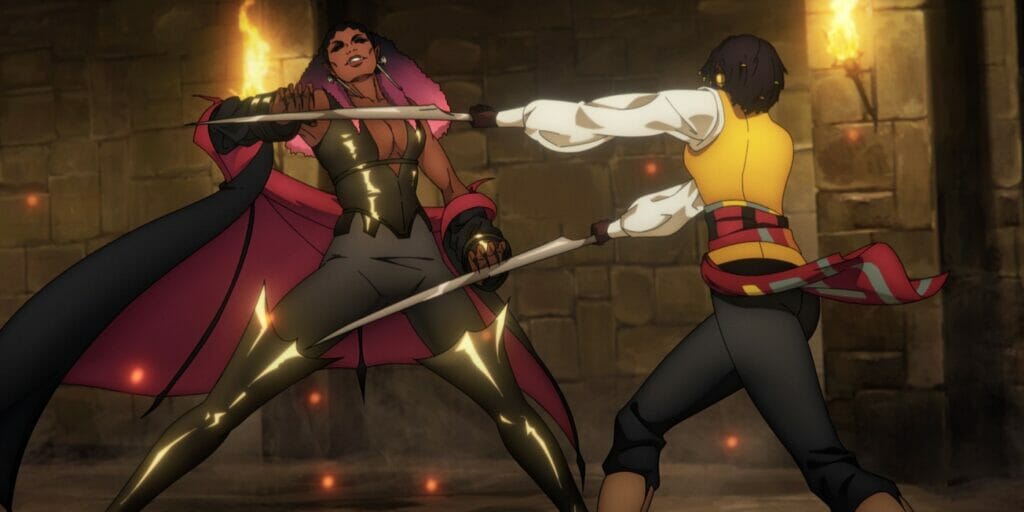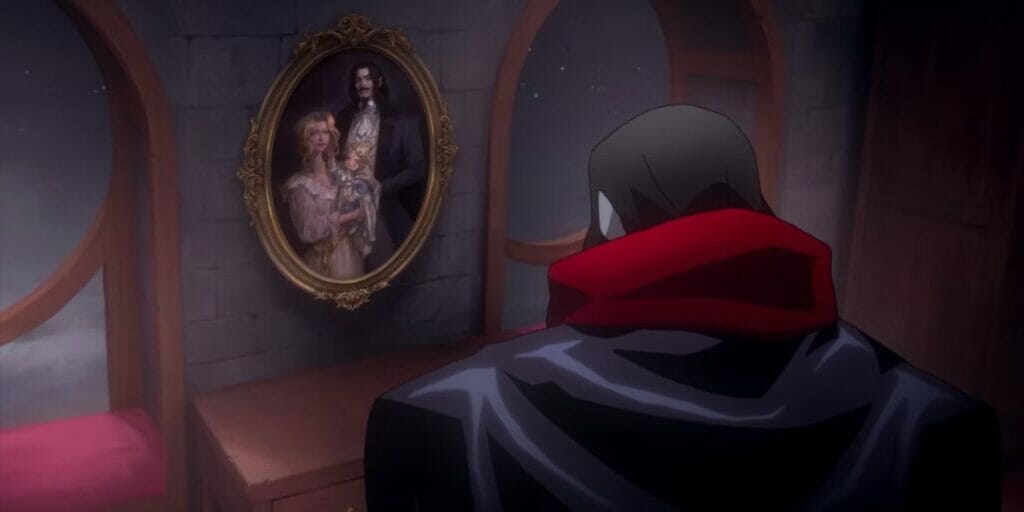Castlevania: Nocturne is a brilliant spin-off boasting a new cast of heroes and villains. It has a lot in common with its predecessor. Most elements of Nocturne compare well with Netflix’s four-season epic. The new Belmont is excellent, the new action scenes are compelling, and the new score is heartwrenching. The one area where it falls short isn’t something it got wrong. Castlevania: Nocturne delivers two excellent antagonists who simply can’t compete with Dracula.
The Blood Countess and Her Attack Bat

Erzsébet Bathory is the villain of Castlevania: Nocturne. She’s based on the Hungarian historical figure and the minor boss from Bloodlines. Bathory, sometimes known as The Blood Countess, was accused of torturing peasants and bathing in their blood to retain her youth. The show adds to her mythos, connecting her to powerful ancient forces and eventually letting her become a deity. Followers call her the “vampire messiah.” She claims to be capable of killing the sun, but she doesn’t do much of the dirty work. Drolta Tzuentes appears as an elderly witch offering Bathory some magic power in the game. She’s reimagined in Nocturne as a brutal huntress who carries out the dark whims of her master. Together, they’re fun to watch, if a bit underdeveloped.
The problem with Bathory and Drolta is that they’re generic. There isn’t much about them that we haven’t seen and enjoyed elsewhere. Bathory is an overarching villain in Castlevania: Nocturne. She’s an immense threat, but Drolta is more present and compelling. Drolta is a Catwoman type, always flirting, teasing, and mocking her prey before attacking. She occupies a fascinating position in the show’s power scale. She could kill any of the heroes individually, but if they work together against her, she doesn’t stand a chance. Drolta’s character design is spectacular, perhaps standing out above her personality as her best feature. Narratively, Bathory is just another powerful vampire, and Drolta is a fun mini-boss. Dracula is something else entirely.
Mankind Ill Needs Dracula, but Castlevania Might

I would struggle to overstate the importance of Vlad III Tepeş. The first two seasons of Castlevania belong to him as much as they do to Trevor, Sypha, and Alucard. He’s one of the best villains in recent memory. In the games, Dracula is little more than an intimidating figure on a throne. Netflix’s Dracula is a masterclass in motivation, emotional depth, and sympathetic villainy. He’s universally feared yet deeply compassionate. He’s ruthless yet deliberate. Dracula is the most tragic figure in the series. The Lord of Darkness is funny, relatable, haunted, charming, and complex. His presence elevates the show with such force that his absence is palpable. It’s part of what makes the third season so weak. Erzsébet Bathory and Drolta just can’t compare.
Dracula’s wife-guy routine may not seem like an original motivation. I get that there are probably at least as many villains motivated by a dead loved one as antagonists who want to take over the world. I don’t know how someone could watch Castlevania Season 2 without digging deeper into his motivation. He’s old and tired. Lisa’s death drives him to a point of eternal darkness. It’s more than depression. The one light in his life was taken away, and he wants everyone involved dead, himself included. His misery is critical to his character. Dracula’s kindness to the humans he serves, his unique relationship with the vampires under him, and the duality of his fight against his son are all engaging. Dracula carries the name of a generic video game boss, but he also holds the weight of immortality and everything that comes with it.
RELATED: Netflix’s Castlevania Anime Returns in October
Erzsébet Bathory and Drolta aren’t even technically following Dracula. Seasons 3 and 4 featured other antagonists, but everyone knows whose castle is in the name Castlevania. Dracula is personally responsible for much of the theming in the early seasons. Erzsébet Bathory and Drolta were never going to upstage him. Castlevania: Nocturne competes with its predecessor in everything but its villains. There is no competition with Dracula. He set the bar higher than any other vampire could reach. Could any other villain perfectly deliver “You must be the Belmont” and “‘I’m killing my boy”? Dracula remains undefeated in Castlevania and beyond.





